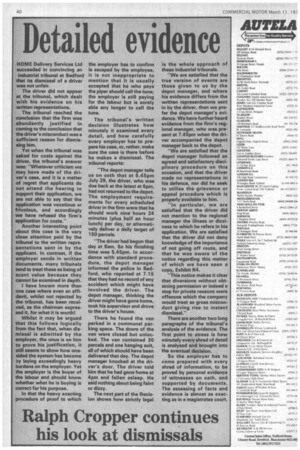Detailed evidence
Page 44

If you've noticed an error in this article please click here to report it so we can fix it.
HOME Delivery Services Ltd succeeded in convincing an industrial tribunal at Bedford that its dismissal of a driver was not unfair.
The driver did not appear at the tribunal, which dealt with his evidence on his written representations.
The tribunal reached the conclusion that the firm was abundantly justified in coming to the conclusion that the driver's misconduct was a sufficient reason for dismissing him.
Yet when the tribunal was asked for costs against the driver, the tribunal's answer was: "Whatever criticism we may have made of the driver's case, and it is a matter of regret that applicants do not attend the hearing to support their application, we are not able to say that the application was vexatious or frivolous, and accordingly we have refused the firm's application for costs."
Another interesting point about this case is the very close attention paid by the tribunal to the written representations sent in by the applicant. In contrast, if the employer sends in written documents, many tribunals tend to treat these as being of scant value because they cannot be examined in depth.
I have known more than one case where even an affidavit, whilst not rejected by the tribunal, has been received, as the chairman expressed it, for what it is worth!
Whilst it may be argued that this follows logically from the fact that, when dismissal is admitted by the employer, the onus is on him to prove his justification, it still seems to show how onesided the system has become by laying exceedingly heavy burdens on the employer. Yet the employer is the buyer of the labour and should know whether what he is buying is correct for his purpose.
In that the heavy exacting procedure of proof to which the employer has to confirm is escaped by the employee, it is not inappropriate to mention that it is usually accepted that he who pays the piper should call the tune; the employer is still paying for the labour but is sorely able any longer to call the tune.
The tribunal's written decision illustrates how minutely it examined every detail, and how carefully every employer has to prepare his case, or, rather, make sure the case is there before he makes a dismissal. The tribunal reports: "The depot manager tells us on oath that at 6.45pm July 29, the driver, who was due back at the latest at 6pm, had not returned to the depot. The employment requirements for every scheduled driver in the firm were that he should work nine hours 24 minutes (plus half an hour lunch) per day, or alternatively deliver a daily target of 150 parcels.
"The driver had begun that day at Barn. So his finishing time was 5.45pm. In accordance with standard procedure, the depot manager informed the police in Bedford, who reported at 7.15 that they had no record of any accident which might have involved the driver. The depot manager, thinking the driver might have gone home, took his supervisor and drove to the driver's house.
There he found the van parked in a communal parking space. The doors of the van were closed but unlocked. The van contained 30 parcels and one hanging suit, all of which should have been delivered that day. The depot manager knocked at the drivers door. The driver told him that he had gone home at 4pm and fallen asleep. He said nothing about being faint or dizzy.
The next part of the Decision shows how strictly legal is the whole approach of these industrial tribunals.
"We are satisfied that the true version of events are those given to us by the depot manager, and where his evidence differs from the written representations sent in by the driver, then we prefer the depot manager's evidence. We have further heard evidence from the firm's regional manager, who was present at 7.45pm when the driver accompanied the depot manager back to the depot.
"We are satisfied that the depot manager followed an agreed and satisfactory disciplinary procedure on this occasion, and that the driver made no representations in his defence, nor did he seek to utilise the grievance or appeal procedure which is properly available to him.
"In particular, we are satisfied that the driver did not mention to the regional manager the illness or dizziness to which he refers in his application. We are satisfied that the driver did not deny knowledge of the importance of not going off route, and that he was aware of the notice regarding this matter of which we have seen a copy, Exhibit R4.
"This notice makes it clear that diversions without obtaining permission or indeed a stop for private reasons were offences which the company would treat as gross misconduct giving rise to instant dismissal."
There are another two long paragraphs of the tribunal's analysis of the evidence. The first point to stress is how minutely every shred of detail is analysed and brought into the eventual decision.
So the employer has to come prepared with every shred of information, to be proved by personal evidence of witnesses on oath, and supported by documents. The assessing of facts and evidence is almost as exacting as in a magistrates court.






















































































































